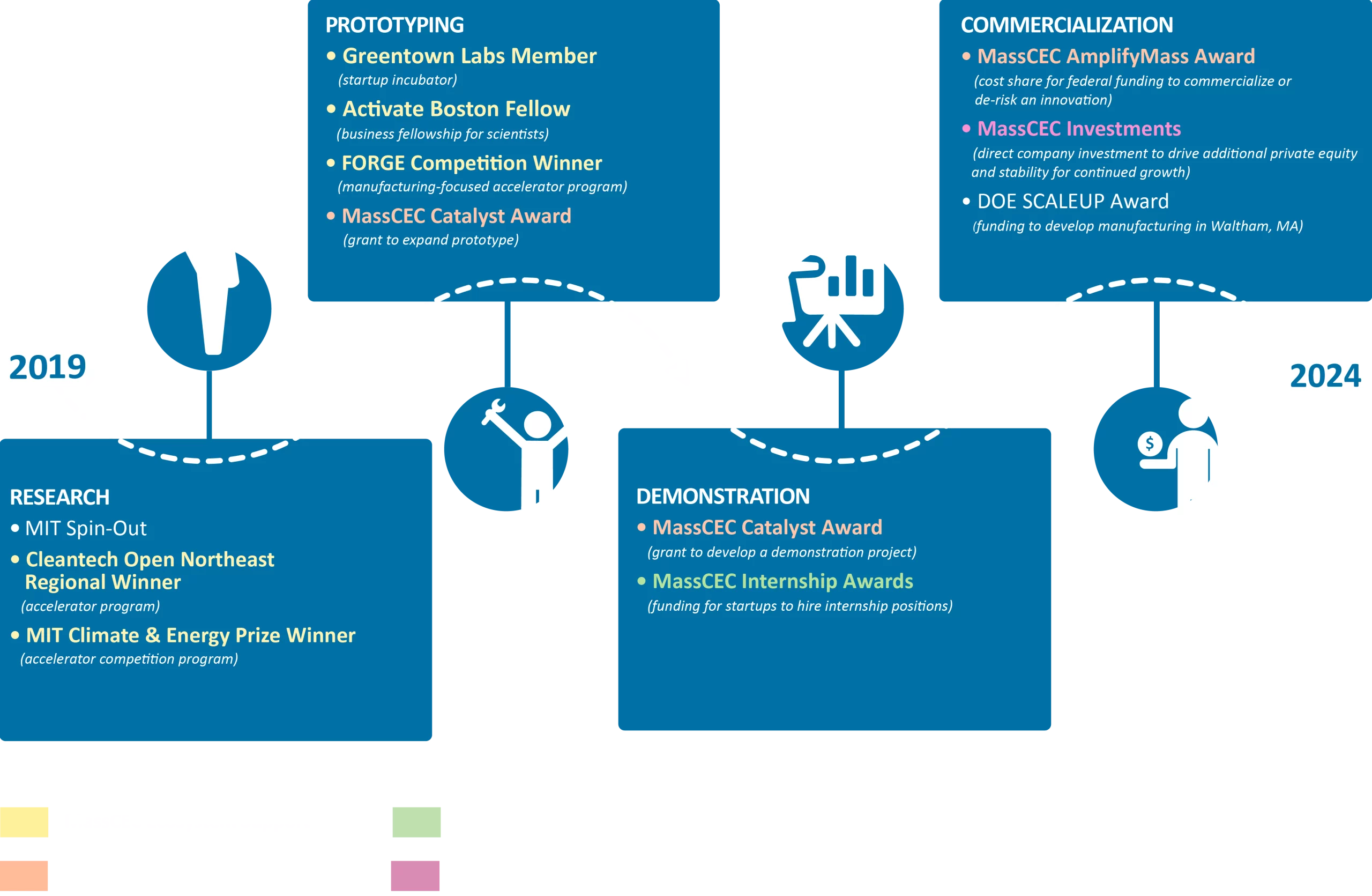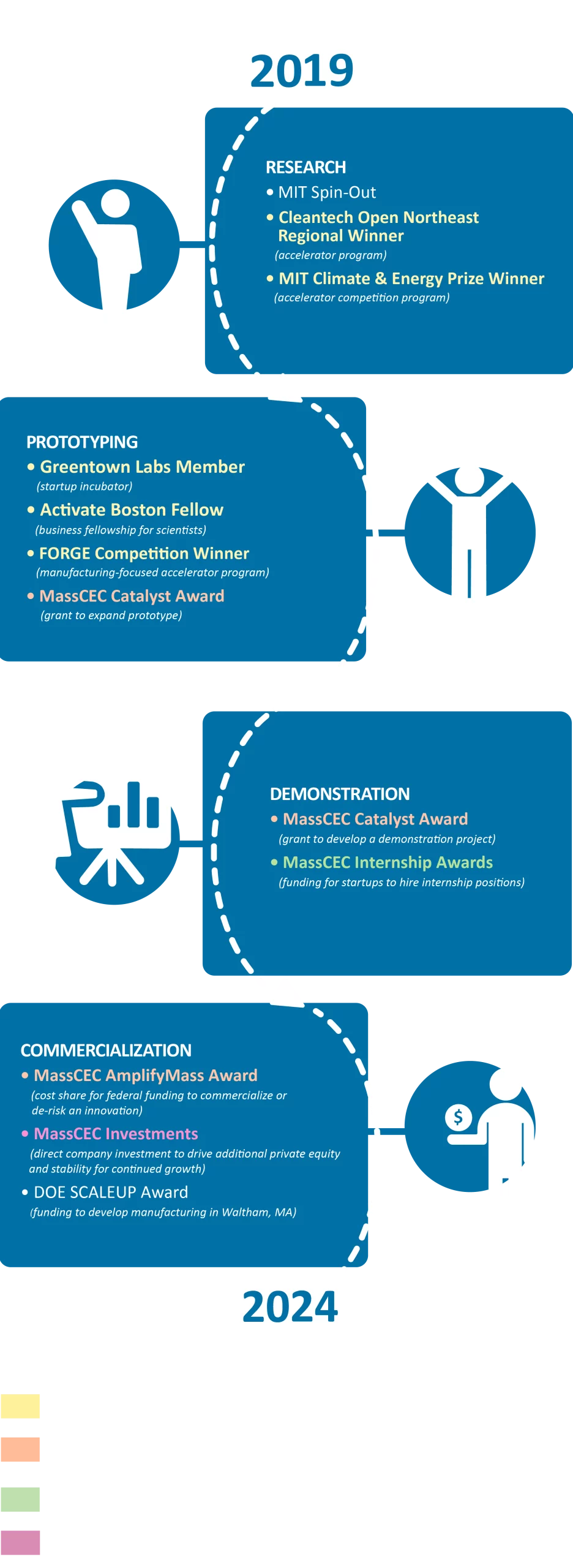Massachusetts Leadership in Offshore Wind
Schematic of the developing Salem Offshore Wind Terminal
Offshore wind will be the Commonwealth’s largest source of clean energy to meet the increased demands of electrification. MassCEC provides pivotal support to the offshore wind industry through work that accelerates the responsible development of offshore wind projects while increasing the role of Massachusetts companies, institutions, and workers in the industry.
As part of this work, MassCEC has entered into a unique private-public partnership with Crowley Wind Services and the City of Salem to redevelop the site of a former oil- and coal-fired power plant, transforming it into the Salem Offshore Wind Terminal. When complete, this site will be the second purpose-built port specifically designed to support the construction of offshore wind in Massachusetts. The Salem Offshore Wind Terminal will support both fixed-bottom wind projects as well as the construction and installation of floating offshore wind in the Gulf of Maine.
As part of this work, MassCEC has entered into a unique private-public partnership with Crowley Wind Services and the City of Salem to redevelop the site of a former oil- and coal-fired power plant, transforming it into the Salem Offshore Wind Terminal. When complete, this site will be the second purpose-built port specifically designed to support the construction of offshore wind in Massachusetts. The Salem Offshore Wind Terminal will support both fixed-bottom wind projects as well as the construction and installation of floating offshore wind in the Gulf of Maine.
The first dedicated offshore wind port in Massachusetts is the New Bedford Marine Commerce Terminal, which is owned and operated by MassCEC. Vineyard Wind began its lease of the Terminal in January 2023 and, in January 2024, announced the delivery of the first offshore wind power in the state.
A 2023 report found that Vineyard Wind’s reported numbers for the Vineyard Wind 1 project doubled the initial projections in both jobs created and economic output, a fact attributed partly to a longer than expected development period and changes to the overall project parameters.1
Gulf of Maine
Planning Process
- Four areas leased in 2024 auction
- BOEM, states, developers, and stakeholders planning for future floating wind projects
Southern New England
Largest Offshore Wind Area in U.S.
- Informed by 15 years of stakeholder engagement, wildlife surveys, and metocean data collection
- More than 14GW of renewable energy capacity to serve regional markets
- 1 project operating, 2 projects in construction, and 6 projects in development
Massachusetts Offshore Wind
5.6 GW Authorized
- 2 GW awarded in state’s 4th procurement
- 20+ GW needed to meet climate goals
Modernizing the Electric Grid
Modernizing the Electric Grid
The majority of our country’s electric grid was built in the 1960s and 1970s, and it is increasingly apparent that it is ill-equipped to address the needs of a changing climate. It was not designed to accommodate distributed renewable energy generation, energy storage, increased electrification of buildings and transportation, and more frequent and higher intensity weather and natural disasters. The grid must be upgraded and modernized, but questions remain about how to do it equitably and cost-effectively.
The future electric grid is one that enables a decarbonized energy system and supports:
- Massachusetts’ 2050 climate goals
- High levels of reliability, resilience, efficiency, and flexibility
- Pathways for innovative solutions
- An equitable energy transition
MassCEC’s Net Zero Grid program helps Massachusetts stakeholders answer some of these difficult questions and develop innovative solutions to equitably meet our climate goals.
MassCEC’s Net Zero Grid programs span the electric grid
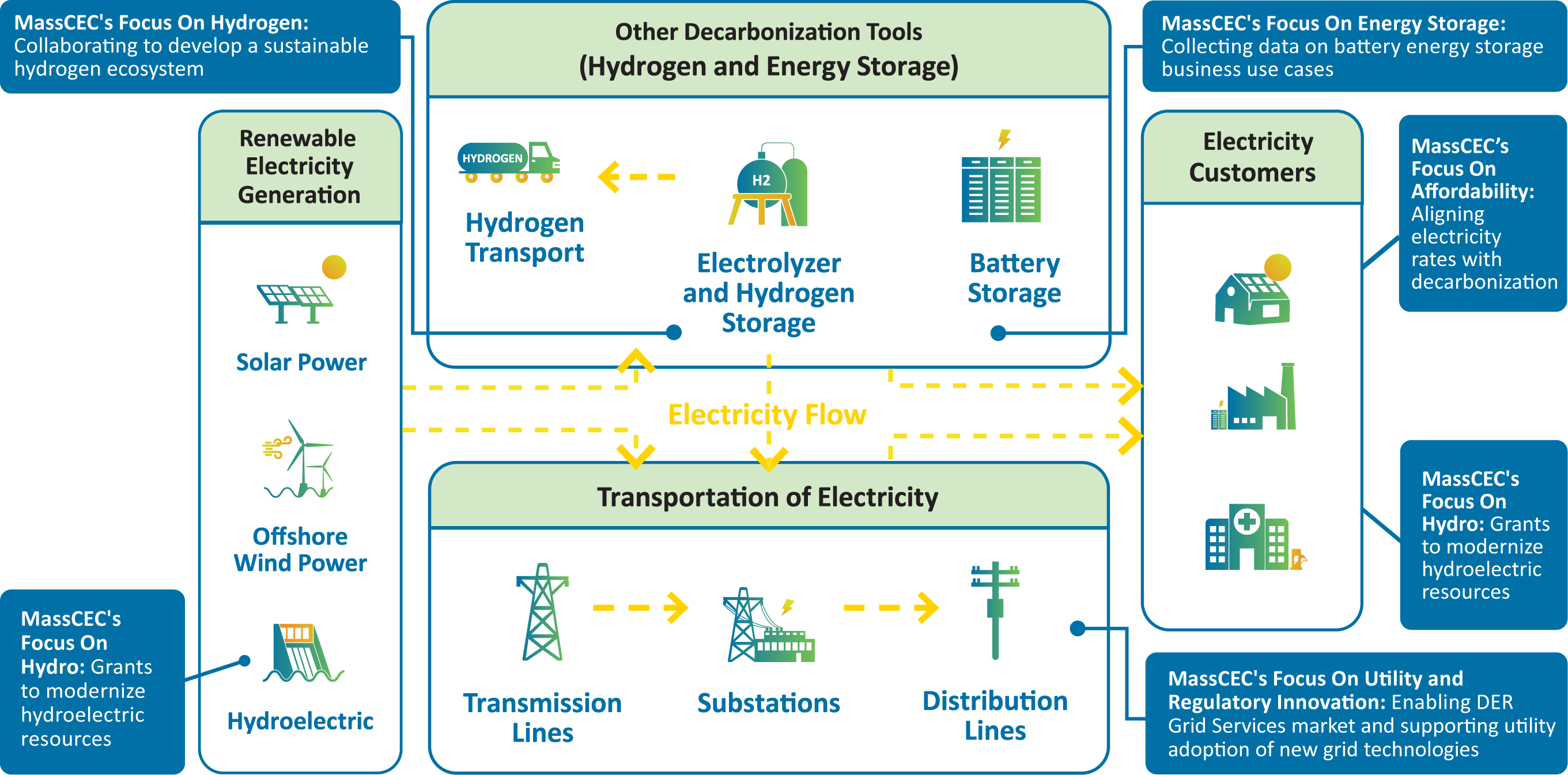
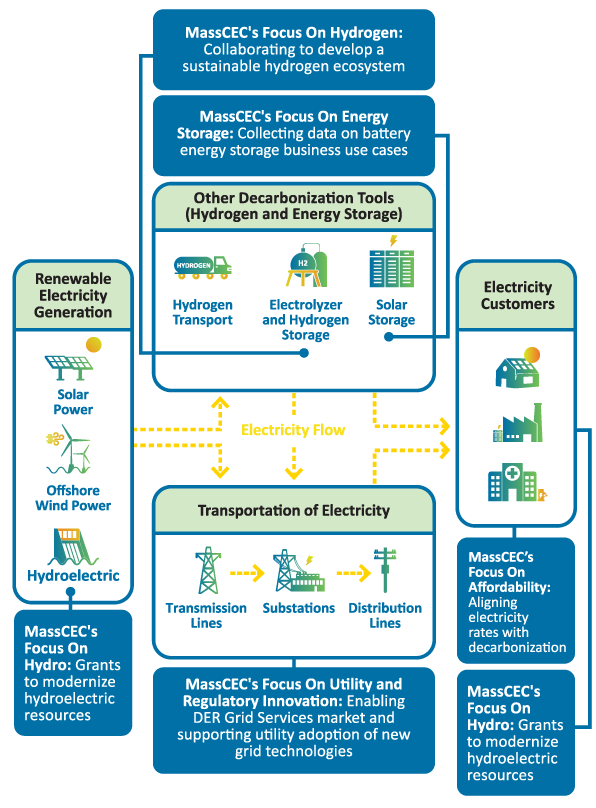
Tracking Key Barriers to Modernizing the Electric Grid
Cost is one of the key barriers to our transition to a future grid, and utilizing the flexibility of distributed energy resources (DERs) is one solution to make the grid more cost-efficient. MassCEC’s Grid Services Study is a multi-stakeholder project that will create a new method for compensating DERs for responding to grid needs and an implementation plan for how to maximize the value of DERs to the distribution grid. This work, which will unlock additional opportunities for virtual power plants to develop and support the grid, is conducted in partnership with the Massachusetts investor-owned utilities (National Grid, Eversource, and Unitil), the Massachusetts Department of Energy Resources, and the Massachusetts Office of the Attorney General.
Accelerating the Adoption of Key Grid Technologies
Grid resilience, or the ability of the electric grid to prepare for, withstand, and recover from disruptive events, will become increasingly important as homes, businesses, and transportation electrify and are more dependent on the grid. MassCEC received $13.5M in federal funding to support projects that equitably enhance the resilience and reliability of Massachusetts’ grid, support the state’s clean energy and decarbonization goals, and create good-paying jobs.
Emerging grid technologies (gridtech) will be pivotal in the grid transition, helping to optimize existing grid capacity, enable more flexible operations, and empower customer control of energy usage. However, gridtech faces many barriers to adoption and scaling, particularly given the complicated regulatory environment that utilities are in. MassCEC’s Net Zero Grid program provides support to gridtech companies and utilities by providing grants and facilitating partnership opportunities for technology adoption and scaling the deployment of gridtech to benefit ratepayers.
Emerging grid technologies (gridtech) will be pivotal in the grid transition, helping to optimize existing grid capacity, enable more flexible operations, and empower customer control of energy usage. However, gridtech faces many barriers to adoption and scaling, particularly given the complicated regulatory environment that utilities are in. MassCEC’s Net Zero Grid program provides support to gridtech companies and utilities by providing grants and facilitating partnership opportunities for technology adoption and scaling the deployment of gridtech to benefit ratepayers.
Facilitating collaboration and convening key stakeholders and decision makers
MassCEC, in partnership with the Alliance for Climate Transition, a Massachusetts-based non-profit organization, developed the Transitioning to the Future Grid Event Series to discuss how innovation and collaboration across the industry can help achieve the “future grid.” The series concluded with a set of actionable recommendations that would facilitate an efficient, equitable, and clean grid. Over three hundred diverse stakeholders from across the grid landscape attended the events and contributed to the recommendations.
“Events like this foster the excellent dialogue needed to pave the way forward as we collaborate, act, and lead the response to the climate crisis. Let’s continue to work together to make a meaningful impact!”
~ Transitioning to the Future Grid Event Participant
Charting a Path to Home Decarbonization
Charting a Path to Home Decarbonization
Courtesy of a homeowner in Plainfield, MA participating in the pilot program
Transitioning existing homes away from fossil fuels can be challenging. Many homeowners struggle to navigate the planning, new technologies, and home improvements needed. MassCEC’s Decarbonization Pathways program has developed comprehensive home decarbonization assessments, providing homeowners with a plan, technical assistance, and financial incentives for implementation. With this pilot, MassCEC created and tested a model for comprehensive consumer engagement and home decarbonization that could be scaled for statewide adoption.
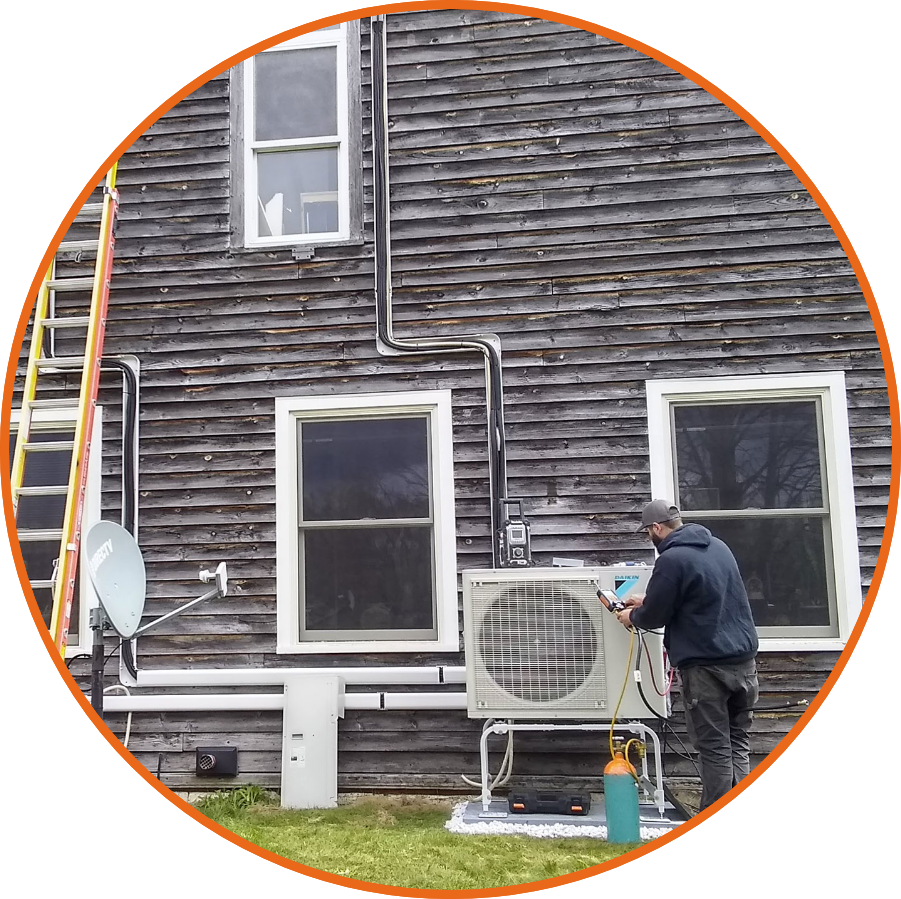
Courtesy of a homeowner in Plainfield, MA participating in the pilot program
Decarbonization Pathways by the Numbers:

76
Total units/homes participating

67%
Of units owned by low- and moderate‑income homeowners

$4M
Deployed, including public and private investment (projected)
“I never could have done it by myself – having that roadmap and the prioritizations were really helpful to visualize everything and make sure everything gets accomplished…I am so grateful for this project. It has really enhanced the quality of all of our lives.”
~ Holyoke, MA Homeowner
Electrifying Massachusetts School Buses
Electrifying Massachusetts School Buses
MassCEC’s Accelerating Clean Transportation (ACT) School Bus program assists public school districts and transportation providers
in completing successful electric school bus deployments. The program prioritizes underserved and overburdened school districts and offers free consulting services to provide a long-term path for fleet electrification. ACT School Bus also assists award recipients of the Environmental Protection Agency’s (EPA) Clean School Bus program, which helps bring millions of federal funding into the state.
in completing successful electric school bus deployments. The program prioritizes underserved and overburdened school districts and offers free consulting services to provide a long-term path for fleet electrification. ACT School Bus also assists award recipients of the Environmental Protection Agency’s (EPA) Clean School Bus program, which helps bring millions of federal funding into the state.

Electric school bus in Quincy, MA
Electric school buses eliminate tailpipe exhaust, which is a significant source of air pollution linked to asthma and other respiratory issues in children. Replacing a single diesel school bus with an electric one helps eliminate the equivalent of about 147 metric tons of carbon dioxide each year. This transition also improves air quality around schools and along bus routes, directly benefiting students’ health. ACT School Bus has informed the development of similar programs in New Jersey, the National Renewable Energy Lab, the Connecticut Green Bank, and other financing entities across the country. MassCEC’s ACT School Bus program was recognized by the Clean Energy States Alliance (CESA) and awarded the 2024 State Leadership in Clean Energy (SLICE) Award for leadership in innovation, cost-effectiveness, and replicability.2
MassCEC’s Impact

$133M
Leveraged in public and private funding
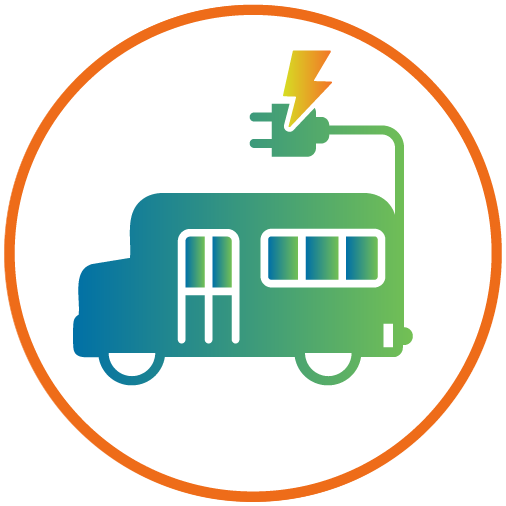
272
Electric buses and charging infrastructure funded to date

22
School districts awarded across Massachusetts
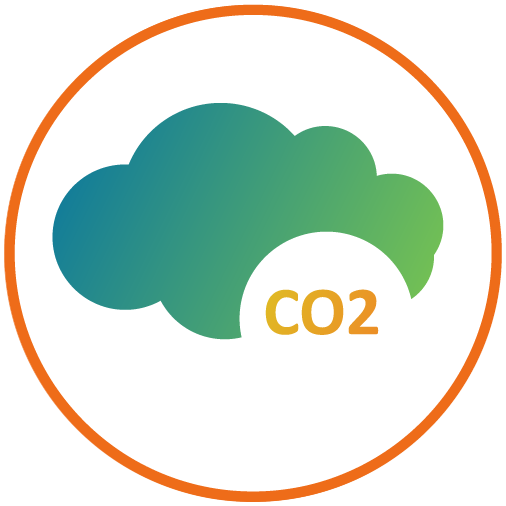
3M+
Kilograms of carbon dioxide prevented from former diesel buses
“Diesel-fueled school bus emissions are especially harmful to vulnerable children in low- and moderate‑income communities…It is a thoughtful approach to equity, creating tangible public health benefits, while decarbonizing transportation. By working with school districts to increase a wide range of capacities needed to roll out a successful conversion to EV buses, this program stands out.”
~ CESA SLICE Award Judge on MassCEC’s ACT School Bus Program
Offshore Wind Workforce and Community of Practice
Staging of offshore wind turbine components at MassCEC’s New Bedford Marine Commerce Terminal.
Offshore Wind Workforce and Community of Practice
Staging of offshore wind turbine components at MassCEC’s New Bedford Marine Commerce Terminal.
Since 2017, MassCEC has awarded over $18M to 30 different organizations and institutions to advance offshore wind workforce development, improve access to opportunities, and conduct workforce studies. This funding has enabled the construction of multiple facilities and infrastructure projects, the purchase of specialized equipment, targeted recruitment for existing training programs, support to enable workforce participation, and increased interest in offshore wind careers.
MassCEC has also established a Community of Practice for Massachusetts Offshore Wind Workforce Training and Development. This unique initiative connects a network of 30 offshore wind workforce grantees, partners, and stakeholders to facilitate information sharing, collaboration, and resource coordination. Through this effort, MassCEC is supporting a cohesive ecosystem of training providers, educational institutions, community development organizations, and support services across the Commonwealth to cultivate a world-class offshore wind workforce in Massachusetts.
MassCEC has also established a Community of Practice for Massachusetts Offshore Wind Workforce Training and Development. This unique initiative connects a network of 30 offshore wind workforce grantees, partners, and stakeholders to facilitate information sharing, collaboration, and resource coordination. Through this effort, MassCEC is supporting a cohesive ecosystem of training providers, educational institutions, community development organizations, and support services across the Commonwealth to cultivate a world-class offshore wind workforce in Massachusetts.
“The Offshore Wind Works program has been instrumental in advancing Massachusetts Maritime Academy’s Maritime Center for Responsible Energy (MCRE) Global Offshore Wind (GWO) training initiatives, providing more than 1,000 course participants with the skills necessary to work safely in this thriving industry. Through the OSWW Community of Practice, we have fostered collaboration and shared expertise, amplifying the impact of our programs and strengthening the region’s offshore wind workforce.”
~ Captain Michael Burns, Jr., Executive Director, MCRE, Massachusetts Maritime Academy
“MassCEC has awarded Local 56 a grant to support workforce training specifically for offshore wind projects. This funding will significantly enhance our capabilities in this rapidly growing sector. Over the past three years, our operations have seen remarkable growth. In 2022, we logged 15,000 work hours. This increased to 35,000 hours in 2023; in 2024, we achieved an impressive 70,000 work hours. MassCEC’s support is a tremendous opportunity for Local 56 to excel and lead in the offshore wind industry.”
~John Dunderdale, Business Manager – Pile Drivers and Divers Local Union 56
Regional Leadership In Offshore Wind
Regional Leadership In Offshore Wind
MassCEC, the U.S. Department of Energy, and the State of Maryland provided funding to a team led by University of Massachusetts Amherst and Johns Hopkins University to establish the Academic Center for Reliability and Resilience of Offshore Wind (ARROW). Offshore wind must provide reliable power at scale and be resilient to recover quickly from disruptions. ARROW’s regional approach is a cross-cutting effort to advance these national priorities for offshore wind.
ARROW will prepare the next generation of offshore wind professionals, researchers, and educators to achieve U.S. deployment goals through a multidisciplinary program of education and research.
ARROW will prepare the next generation of offshore wind professionals, researchers, and educators to achieve U.S. deployment goals through a multidisciplinary program of education and research.

ARROW brings together 8 institutions, 25+ industrial partners and governmental agencies, and 3 National Labs, and will operate in three program areas:
- ARROW-Empower prepares the next generation of offshore wind professionals through leadership in comprehensive offshore wind education.
- ARROW-Innovate focuses research and innovation on increasing reliability of offshore wind and advancing targeted solutions for offshore wind resilience.
- ARROW-Engage encompasses outreach aspects of the center and integrates principles of diversity, equity, inclusion, and accessibility into the fabric of ARROW’s operations, education programs, and research initiatives.
Empowering Massachusetts Communities’ Adoption Of Clean Energy
Empowering Massachusetts Communities’ Adoption Of Clean Energy
Everyone needs and deserves to be part of our clean energy future, but underserved populations have less access to the benefits of clean energy and spend more of their paycheck on energy costs. MassCEC’s Empower Massachusetts program provides funding for local organizations to innovate, develop, and implement targeted community‑based clean energy solutions. The program provides funding to address resource gaps, facilitate local engagement, and drive collaboration in underserved communities.

Worcester HEART received a $25K grant focused on efficiency and electrification of triple-decker housing and development of a local workforce
Results Across the Program
Awarded over $13.3 million over 3 years to grantees to support:

130
Projects

20+
Workshops to share approaches

200+
Organizations

24+
Projects advanced to receive additional funding

Taking Control Of Homeowner Energy Bills
MassCEC provided a $150K Empower Massachusetts grant to All In Energy to work with communities in North Suffolk and Merrimack Valley regions to assist residents and small businesses in reducing energy use, improving buildings, and saving money.
All In Energy provided energy bill check-ups, which helped residents to better understand their electric bills and determine if they were overpaying for electricity.3 This critical work demonstrated that 29% of residents and businesses needed translation of energy information and options into a language other than English. All in Energy also collaborated with Mass Save® Community First Partnership to expand the effort and benefits offered.
All In Energy provided energy bill check-ups, which helped residents to better understand their electric bills and determine if they were overpaying for electricity.3 This critical work demonstrated that 29% of residents and businesses needed translation of energy information and options into a language other than English. All in Energy also collaborated with Mass Save® Community First Partnership to expand the effort and benefits offered.

Impact of MassCEC’s Funding and Mass Save® Community First Partnership

2,215
No-cost home energy assessments for residents

317
Small business contractors connected to Mass Save®

369
Energy bill check ups completed

1,313
Completed weatherization or HVAC upgrades
“I have seen that Energy Bill Check Ups have been a force for empowering residents to take control of their energy bills and finances. Through this program, we’ve been able to shed light on what residents are actually paying for, which has turned their electricity bills from a mystery document that they blindly pay each month into something that is understandable and within their control.”
~ Lauren Krake, All In Energy Community Programs and Partnership Manager
MassCEC Workforce Development
MassCEC Workforce Development
MassCEC’s workforce development programs focus on expanding and diversifying the clean energy workforce, fostering heightened awareness of clean energy careers, and increasing the availability and effectiveness of training and advancement opportunities. The programs address three priority areas: students and young adults, new entrants and incumbent workers, and climate-critical businesses, with a focus on minority and women business enterprises.

In 2023, MassCEC awarded Greenfield Community College (GCC) $1.1M to renovate and repurpose a campus greenhouse to launch an HVAC and heat pump training program. The program will help address the shortage of building decarbonization workers. GCC’s Workforce Development programs serve some of the neediest populations in the community by providing robust wraparound supports and a case management approach to build close relationships with students. GCC connects them to support through community-based organizations and offers communities of practice to build economic and social stability.
GCC also received $150K from MassCEC to support the development of a Youth Climate Corps, which will offer clean energy career awareness outreach and activities for middle schoolers and a summer work experience for older youth. Further MassCEC investments are helping GCC also pursue federal funds to add clean energy training program offerings for students.
GCC also received $150K from MassCEC to support the development of a Youth Climate Corps, which will offer clean energy career awareness outreach and activities for middle schoolers and a summer work experience for older youth. Further MassCEC investments are helping GCC also pursue federal funds to add clean energy training program offerings for students.
“This grant provides GCC with an amazing opportunity to offer career pathways to skilled jobs by providing free training and reskilling programs in the high-growth sector of Clean Energy. These are good jobs in our communities. This equity workforce grant…will allow us to specifically focus recruitment efforts on historically underrepresented members of our community, to create new opportunities for them and their families.”
~ Kristin Cole, GCC’s Vice President of Workforce Development

Expanding on a planning and capacity grant from FY22, in FY23, the Black Economic Council in Massachusetts received $667,664 in workforce equity grant funding to develop and expand its Electric Vehicle (EV) Kickstarter workshops, which help businesses expand into the EV charging industry as resellers, owner-operators, installers, or maintenance providers. MassCEC’s funding was critical in allowing the program to offer back-office support, coaching, and mentoring to 20 minority or women business enterprises to empower entry into the EV charger space. As a result, several participants have subsequently secured contracts on EV charger installation and maintenance, including Better Together Braintrust, which recently secured a contract with the City of Boston to install 68 EV chargers.
“The Black Economic Council of Massachusetts (BECMA) is incredibly grateful to MassCEC for their support in helping to scale our EV Kickstarter program, which guides and accelerates the transition of diverse and experienced entrepreneurs into the electric vehicle charging industry. With our proof of concept established and a growing number of businesses eager to participate, MassCEC stepped in at a crucial moment, providing the essential capital and guidance needed to replicate and scale the program. The initiative not only empowers entrepreneurs and expands their economic opportunities, but also plays a vital role in helping Massachusetts achieve its supplier diversity and clean energy goals.”
~ Nicole Obi, President & CEO of BECMA

Energetics, in partnership with the Automotive Career Development Center, received $1.12M from MassCEC to create a workforce development program focused on fossil fuel workers currently employed as automotive technicians. The program helps upskill workers from environmental justice neighborhoods in their transition to servicing hybrid and electric vehicles, which is a growing segment of the clean energy industry. Launched in March 2024, this program is expected to upskill over 60 participants through 2025.
“We are thrilled to partner with the Automotive Career Development Center and MassCEC to provide essential training to automotive technicians across Massachusetts and prepare the workforce for the growing presence of electric vehicles. This initiative not only strengthens our clean energy workforce, but also prepares technicians and shop owners for an evolving vehicle marketplace.”
~ Victoria McGarril, Energetics, CLEAResult Energy Sustainability Consulting
MassCEC’s 2030 Fund
MassCEC’s 2030 Fund
MassCEC launched the $50M 2030 Fund in 2022 to strategically invest in Massachusetts-based startups and provide funding for teams solving critical climate problems. The fund signals to the market that Massachusetts is increasing its commitment to the commercialization of climate technologies and filling the gap created by a reduction in private venture capital.
MassCEC’s 2030 Fund helps de-risk innovative technology, assists companies in reaching early commercial milestones, and attracts growth funding. MassCEC’s strategy is to attract and leverage significant private venture capital alongside all investments.
MassCEC’s 2030 Fund helps de-risk innovative technology, assists companies in reaching early commercial milestones, and attracts growth funding. MassCEC’s strategy is to attract and leverage significant private venture capital alongside all investments.
Catalytic Capital: Value Created by MassCEC Investment Activities Since 2014

$1.5B
Of leveraged capital

65
Companies supported

21
Companies with successful exists to date
The 2030 Fund investment portfolio consists of 29 companies 4 across 7 areas of focus. Since 2014, MassCEC has invested almost $22M, of which over $15M has been recouped through exits to date.
4 Includes 8 investments made prior to the launch of the 2030 Fund
Total Portfolio By Area
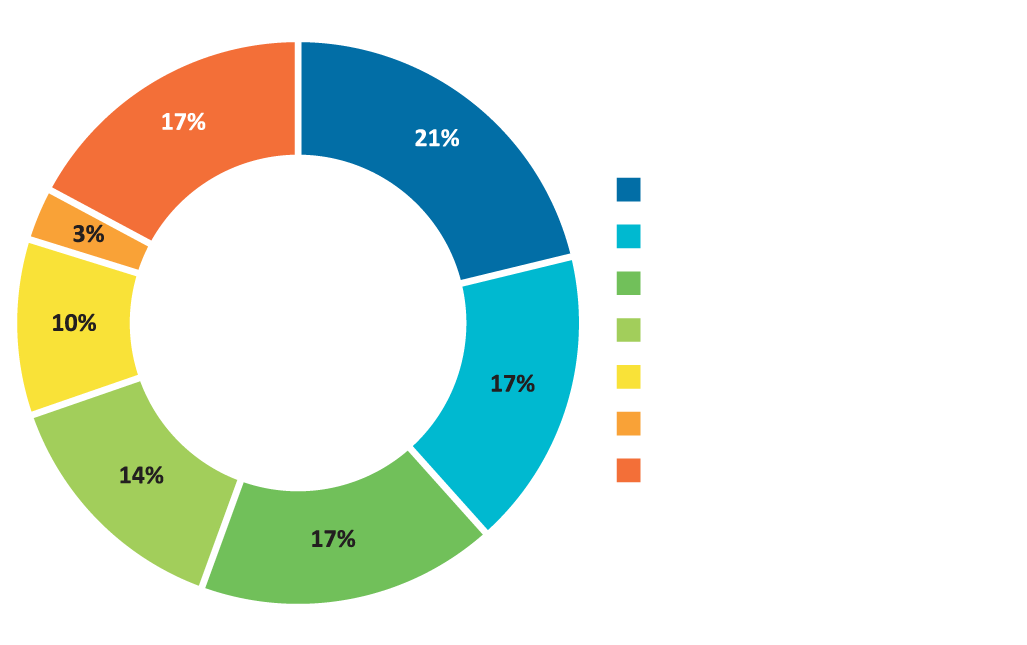
Accelerating Technology to Market
Accelerating Technology to Market
MassCEC’s technology-to-market programs help new climatetech businesses grow faster by backing a vibrant community of researchers, startups, and established industry players – creating an ecosystem where they connect and thrive.
Tech to Market Program Impact

475
Awards
84%
Startup Awardees Still in Business

6,208
New Hires

$53M+
Awarded

$350M+
Leveraged

Through the Innovation Ecosystem Support program, MassCEC assists Massachusetts entrepreneur support organizations to provide robust support for climatetech startup companies. In 2024, MassCEC provided Cleantech Open Northeast, run by the Alliance for Climate Transition, a $120k grant to support its accelerator program. The program provided companies with expert mentoring, professional connections, opportunities to compete for cash prizes, and access to goods and services. Since 2005, Cleantech Open Northeast, which spans from Eastern Canada to Virginia, has supported 642 companies, of which 62% are still active or have had a successful exit. These companies have gone on to raise over $2B in investments, created over 7,800 jobs, and generated over $697M in revenue.5
5 Cleantech Open Northeast Impact Report: www.canva.com/design/DAGaH0Osu0c/hlYKfiLG4U9ivtKIRKXY7w/view
Emerging Climatetech Leaders
AeroShield ribbon cutting at new manufacturing facility in Waltham, MA.
Emerging Climatetech Leaders
AeroShield ribbon cutting at new manufacturing facility in Waltham, MA.
Early-stage clean energy and climatetech companies often face funding gaps that threaten their path to commercial success. MassCEC’s Emerging Climatetech programs help to fill these gaps with grant funding, equity and debt investments, and hands-on commercial and technical support for founders and startups. These programs support companies as they de-risk technology, reach commercial milestones, attract private capital, and grow their businesses in the Commonwealth and beyond.

AeroShield Materials has developed a transparent silica aerogel insert that enables affordable and highly energy-efficient windows, helping to save energy and costs, improve resiliency and reduce emissions from the built environment. MassCEC grant funding and investment capital have helped AeroShield in its prototyping, demonstration, and early commercial stages. Most recently, the company secured $5M in financing from MassMutual Ventures, MassVentures, MassCEC, and other investors, and won a $14.5M grant from the Department of Energy, enabling it to begin building its first manufacturing facility in Waltham, Massachusetts.
